Cook with us as we explore a traditional, southern-style New Orleans Red Beans and Rice recipe with Dr. Richard-Davis.
News
Culinary Medicine Videos in Spanish
Enjoy three different culinary medicine recipes in Spanish! Join us as we learn about Hispanic culture through cooking.
Culinary Medicine Partners with Arkansas Minority Health Commission
On Thursday, February 16, the Culinary Medicine teaching kitchen was filled with all the aromas of a delicious heart-healthy meal. February was Heart Health month, so we made it a point to celebrate with some New Orleans Red Beans and Rice. We partnered with the Arkansas Minority Health Commission’s Southern Ain’t Fried Sundays (SAFS) program to present our first Facebook Live collaborative event. Our mission was to combine the nutritional education portion of culinary medicine with the ideology of SAFS.
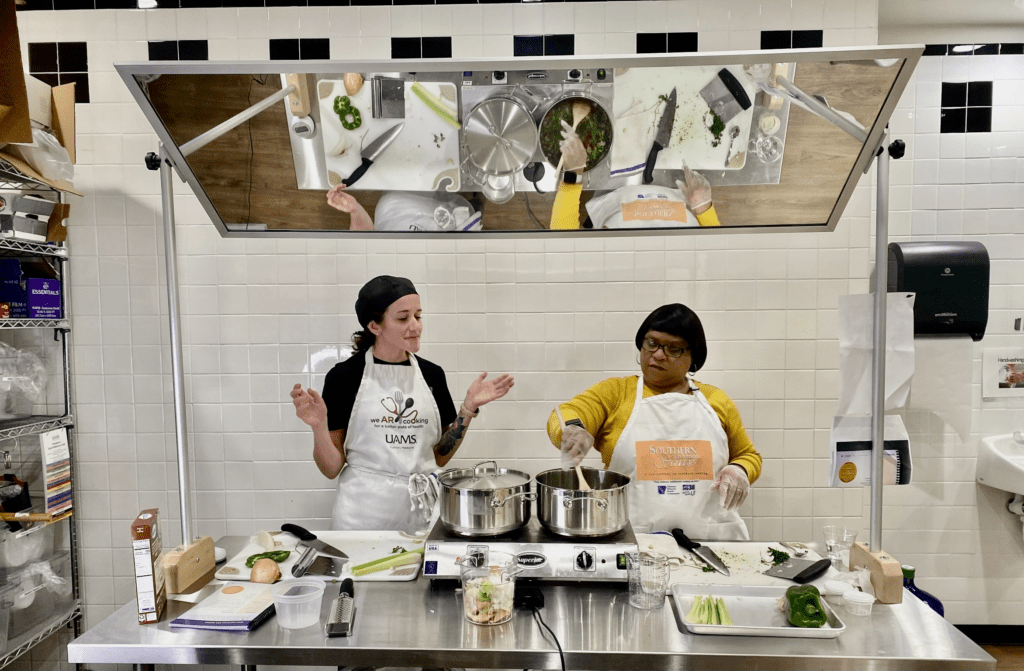
“Southern Ain’t Fried Sundays has a unique approach to helping Arkansans eat healthier by educating people about how to make healthy swaps and prepare traditional, familiar meals in healthier ways. By starting with what is familiar, participants may feel more comfortable incorporating alternatives rather than feeling like they have to start something brand new,” said Alyssa Frisby, RD, and co-instructor of the Facebook Live series. “The partnership between Culinary Medicine and Southern Ain’t Fried Sundays allows us to present easy-to-understand nutrition information and practical culinary skills for the home kitchen to participants, while showing them how to revamp traditional meals into tasty variations that will contribute to better health.”
So why did we cook beans? Because they are familiar. Red Beans and Rice is a classic southern dish. That is what SAFS does. They take a traditional recipe and put a healthy spin on it. For example, cooking with beans and leaving out the meat can be a fantastic way to be kind to your heart. Beans are not only tasty, but they are also a nutritious source of protein and fiber.
While everything turned out delicious, that was not even the best part. One of the most rewarding aspects of the partnership was being able to hand out free meal kits to participating families. The first 20 families to sign up automatically received supplies. The kits consisted of all the necessary ingredients to cook along with us. Co-instructor Ronda Gilbert-Hines said “SAFS is a great program to help jump-start your healthy lifestyle change. Plus, it’s free!”
Don’t worry if you missed out. This was the first in a series of Southern Ain’t Fried Sundays and UAMS Culinary Medicine Facebook Live events. We look forward to doing it again on May 18, August 24, and November 16 (6:00 p.m. – 7:00 p.m.). Mark your calendars and be sure to get in on this opportunity to kick-start your health goals.
UAMS Doctors Earn Certified Culinary Medicine Specialist Credentials
Gina Drobena, M.D., DipABLM, and Kathryn Neill, Pharm.D., FNAP, received Certified Culinary Medicine Specialist (CCMS) credentials in December 2022. This is outstanding news not only for the UAMS Culinary Medicine Program, but also for all Arkansans. Dr. Drobena and Dr. Neill are two out of only four individuals who have earned the CCMS accreditation in the state.
The CCMS course provides an in-depth culinary and nutrition foundation. This credential focuses on techniques that address real-world constraints including meal planning, budgeting, and combining nutrition counseling with pharmacological treatment. It is an advanced, intensive course meant to help instructors further the education of Culinary Medicine to students as well as to the public.
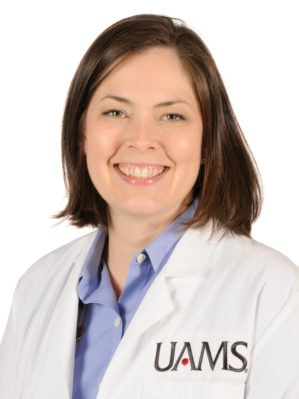
An Arkansas native, Dr. Drobena wears many hats on the UAMS Campus. In addition to being involved with the Culinary Medicine Program, she specializes in Transfusion Medicine, Biotherapeutics and Lifestyle Medicine. Dr. Drobena began her training at UAMS in 2000 and subsequently joined the faculty. She is currently the Division Director of Transfusion Medicine and an Associate Professor in the Department of Pathology. Dr. Drobena was drawn to the Culinary Medicine Program due to her personal interest and passion for how food can affect the mind and body.
“Teaching culinary medicine skills to our wide array of learners has been one of the most rewarding aspects of my career,” Dr. Drobena said. “I obtained certification to translate my passion into an easily recognizable credential that shows we at UAMS are working to move the health of Arkansans forward and are a premier educational institution for culinary medicine.”
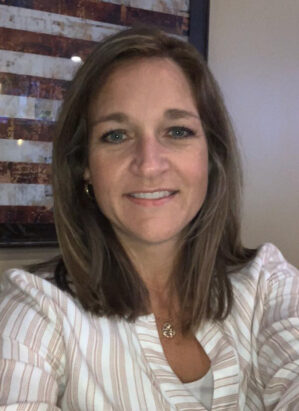
Dr. Neill is an Associate Professor in the Department of Pharmacy Practice at UAMS. She received a fellowship in Neuropharmacology and practiced as a Pulmonary and Critical Care Specialist for the UAMS Intensive Care Unit. Currently, Dr. Neill works in the Division of Academic Affairs where she holds the titles of Associate Provost for Academics and Director of Interprofessional Administrative and Curricular Affairs. The Culinary Medicine Program hosts a variety of Interprofessional Education classes, and Dr. Neill has guided the integration of Culinary Medicine as a longitudinal theme in the campus-wide UAMS IPE curriculum.
“As a pharmacist, diet and lifestyle recommendations have always been a key part of my practice. The growth and recognition of Culinary Medicine and Lifestyle Medicine as specialties highlights how essential these principles are to the health of all patients that we serve as well as being key to our personal wellness,” Dr. Neill said. “The Culinary Medicine Program at UAMS provides a foundation to empower students and providers with the knowledge and skills to address therapeutic nutrition planning across the spectrum. I obtained certification to improve my ability to help develop UAMS’ commitment to creating successful interprofessional education and collaboration with culinary medicine as a key component in patient care.”
The goal of the UAMS Culinary Medicine Program is to supply health care providers with knowledge on healthy food choices and culinary skills to enhance their ability to counsel patients on prevention and disease-specific management through food. There is a hope to provide education not only to students and patients, but also to expand outreach to the various communities in Arkansas. Because they received CCMS credentials, Dr. Drobena and Dr. Neill are now even better equipped to spread the message of using food as medicine.
Culinary Medicine Visits the Stocked and Reddie Pantry
CM Creates Fast and Frugal Recipe from Stocked and Reddie Supplies
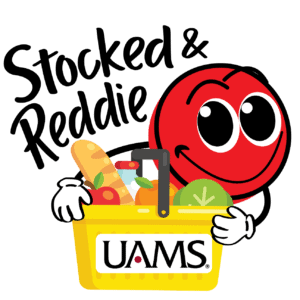
There is a very unassuming building located on Monroe Street, just off the UAMS Little Rock campus. It’s an average run-of-the-mill brick and mortar. What goes on inside is not so average, however. Welcome to the Stocked and Reddie Pantry.
When you walk into the Stocked and Reddie pantry, you’re instantly greeted at the door. An employee asks for your UAMS or Arkansas Children’s Hospital badge, and then you’re all set to shop. The pantry is a neatly organized maze of all the essentials. The pantry has everything from shampoo and conditioner to fresh produce (when available). Stocked and Reddie is run by a handful of charming employees that will make you feel welcomed and comfortable. These employees are on a mission.
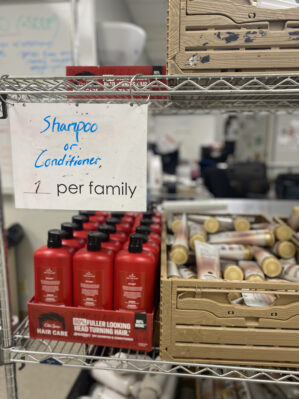
“We’re on a mission to provide nutritious food to ACH & UAMS employees, students, residents, and interns who sometimes find it difficult to access fresh produce and balanced meals for themselves and their families,” Jennifer Mondragon, the manager at the pantry, said.
She described several different frequent shoppers and their current circumstances.
“I was able to meet a man whose wife had passed, and he didn’t know how to cook. He was accessing the pantry and I was able to share some ideas and techniques with him along with some recipes for things we gave out for that day,” she said.
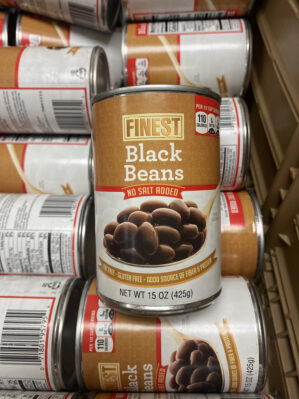
Jennifer explained that they try to choose daily items that go well together in a recipe.
Every shopper is allowed up to three wholesome meals per visit, and they can
visit twice per week. The shopping hours are Mondays and Thursdays from
12:00 p.m. to 6:00 p.m.
If you’re a student, resident, or employee of UAMS or ACH that could use a little extra help, please don’t hesitate to take advantage of the Stocked and Reddie Pantry. It’s here to make your life a little easier.
Budget Friendly Bean And Pasta Soup
Need a frugal and fast recipe? We’ve got you covered for dinner tonight!
Prepares six servings
Ingredients
- 1 small onion, chopped small
- 1 teaspoon vegetable oil
- 1-15 oz can chickpeas, drained and rinsed thoroughly
- 1-15 oz can cannellini beans, drained and rinsed thoroughly
- 1-15 oz can tomatoes
- 1-15 oz can corn
- 28 oz water
- 8 oz pasta
- Additional water (as needed)
- Cooked chicken strips (optional)
Instructions
- In a large soup pot with a lid, heat the oil over medium heat.
- Add in the chopped onion and cook until the onion becomes soft.
- Add in the corn, beans and the canned whole tomatoes (juice and all!). Stir to combine and to break up the tomatoes into smaller chunks.
- Add in the 28 oz water, plus an additional two cans full of water. Bring the broth to a boil. When the water is boiling, add in the pasta. Cook according to the package directions.
- Add cooked chicken strips, diced
- Serve immediately or let cool completely and refrigerate for two to three days or freeze for one to two months.
Enjoy!
Location and Contact
Dr. Drobena Presents at National Conference
Gina Drobena, M.D., presented at the Teaching Kitchen Research Conference in Los Angeles, California on October 19. The poster presentation entitled “Developing Knowledge, Attitudes and Perceptions to Advance Culinary and Lifestyle Medicine and Health Equity through Interprofessional Collaborative Care” demonstrated the effectiveness of the implementation of a three and a half hour interprofessional teaching kitchen session consisting of orientation (Culinary Medicine (CM), Mediterranean/plant-based diet, mindfulness, basic kitchen skills/safety), and an immersive cooking activity with case-based patient application. A debriefing discussion was conducted monthly as part of a campus-wide interprofessional curriculum requirement. Key result findings demonstrated a knowledge mean scores increase of 25% as well as mean Likert scores of (4.4-4.8), indicating students agreed this was an effective learning experience.
Drobena’s study concluded that interprofessional teaching kitchen activities positively impact students’ attitudes and perceptions regarding dietary practice, culinary skills, weight bias, food insecurity, interprofessional collaboration to provide healthy eating education, and the importance of changing provider-patient care conversations from a weight-based focus to healthful eating and activity.
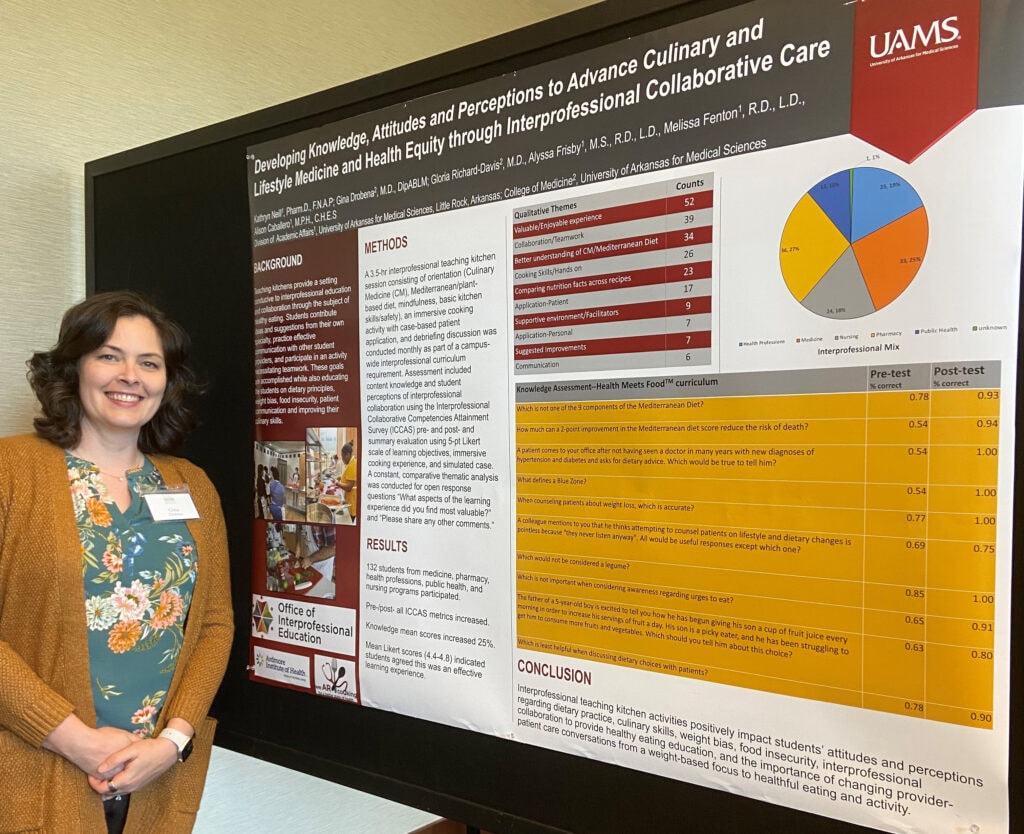
Shifting the Paradigm of Health with Culinary Medicine
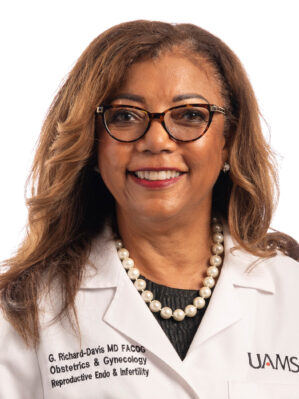
Dr. Gloria Richard-Davis, Program Director for the Culinary Medicine program at UAMS, recently authored “Shifting the Paradigm of Health with Culinary Medicine” on the MedTech Outlook website.
The article introduces the Culinary Medicine program at UAMS and discusses the benefits of the curriculum.
UAMS Nurses Enjoy Cooking, Eating, Learning through Culinary Medicine
By Ben Boulden
July 22, 2022 | The UAMS Culinary Medicine Kitchen offers Team UAMS members like Dees Davis, RN, an opportunity to eat what they have learned at the end of a class.
As part of a nurses’ retreat, Davis, a clinical services manager in the UAMS Medical Center, and about two dozen of her nursing colleagues participated in a 90-minute Culinary Medicine class. The nurses paired up and then chose to prepare either breakfast, lunch or dinner. Each meal included three easy-to-prepare recipes.
Davis said she wasn’t sure what the class would involve, and half expected a demonstration and nutritional education presentation.
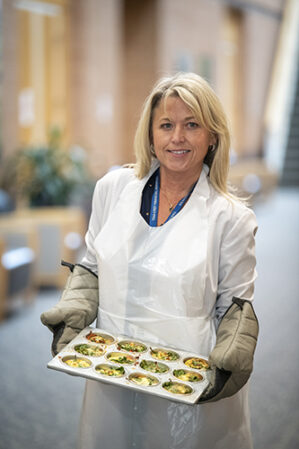
“I was pleasantly surprised when I realized we were going to cook and get our hands dirty,” Davis said. “It was a lot of fun. I was also surprised how easy it was to put together some of these meals. These recipes I had never made on my own. I had heard of frittatas but didn’t realize they were so easy to make.”
Culinary medicine is a new evidence-based field that blends the art of food and cooking with the science of medicine. Culinary medicine’s goal is to help people make good personal medical decisions about accessing and eating high-quality meals that help prevent and manage chronic disease and restore well-being.
Davis partnered at one of the cooking stations with Rebecca Smith, RN. In addition to the frittata, they decided together to prepare a mango salsa with chips.
Instructor Alyssa Frisby, M.S., RD, spoke to the class about nutrition and offered sanitation and safe food preparation tips. She also advised the class to read through the entire recipe before they started.
“That would have been helpful. We should have read the recipe completely,” Davis said. “It turned out well in the end though. We should have chopped up the spinach before we added the other ingredients for the frittata. It was challenging to get them in the cups. That would have made it a little easier when putting them in the muffin pan.”
Cutting the mango was a little difficult to do, she said, but that also paid off well. The mango salsa was Davis’ favorite part of the breakfast she and Smith ate later.
“It’s good instruction on how to use fruits and vegetables along with meats,” Davis said. “I tried the pork, and it was awesome. I’m big on spices and seasoning. If I can’t taste it, then I am not going to eat it. Routine, daily cooking gets monotonous, and it’s sometimes hard to think of things that are healthy and fairly easy to fix. Now, I have some new recipes to try at home.”
Once the food was cooked, the fun truly got started.
“We put some music on and everyone sat around after cooking and ate.” Frisby said. “We talked about the food, taste, texture, what we enjoyed. That’s a big component of culinary medicine and the Mediterranean diet, that social aspect. We hit all of that.”
Davis said she’s not sure she would have signed up for the Culinary Medicine class if it hadn’t been promoted as part of the retreat, but she’s glad she did.
“Until I see something, I sometimes don’t buy into it,” she said. “I have definitely bought into this program. I think it was great and effective. I would take another class.”
To create the kitchen, space on the first floor of the UAMS Donald W. Reynolds Institute on Aging was remodeled. Crews finished the project in October. Frisby joined the program in January and in February, Melissa Fenton, RD, started as program manager and instructor.
Gloria Richard-Davis, M.D., MBA, serves as program director.
“It’s an exciting time for Culinary Medicine,” Fenton said. “We are grateful for the interest both externally outside campus and internally from departments requesting workshop series from us.”
Despite launching during the pandemic, interest and participation in the program has been strong. Culinary Medicine instructors teach an eight-week elective course to College of Medicine students. The program also offers a course for UAMS students in interprofessional teams and standalone workshops for university employees, like the one Dees Davis participated in. “
To reach different community groups outside of UAMS, Culinary Medicine is collaborating with the Arkansas Minority Health Commission and the City of Little Rock to teach similar cooking classes.
“‘We AR Cooking for a better state of health’ is not just a motto for us, it is our mission,” Richard-Davis said. “Our goal is to teach communities across the state healthy foods choices that are palatable, affordable and accessible. We meet patients where they are and work to transform familiar dishes into healthier versions, by adding vegetables, fruits. Our recipes are ‘plant slant’ or Southern plant-based dishes.”
The Culinary Medicine academic classes use a licensed curriculum— Health Meets Food, from Washington University in Washington, D.C. Fenton said it weaves in appropriate recipes and nutrition education to teach students and residents how to use culinary medicine to teach patients how to manage a disease.
“One of the things we like to focus on in culinary medicine is how can we make healthy foods taste good,” Frisby said. “Having participants in the kitchen to smell the ingredients, to taste them, to see the final product and see all the textures and colors reinforces the nutrition education learned in the first part of the class. They remember more and learn more when they are hands-on.”
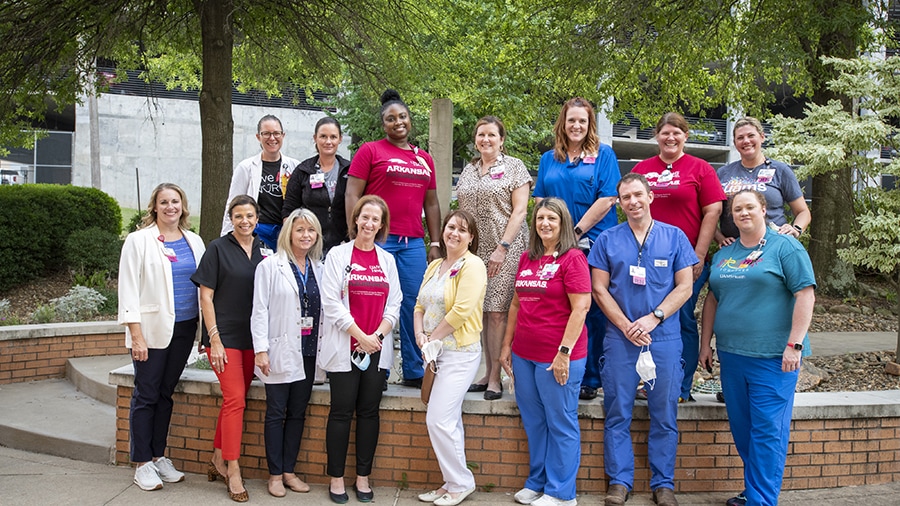
Photo by Bryan Clifton (Image credit: Bryan Clifton/UAMS)
Presentation at J.A. Fair
Session One
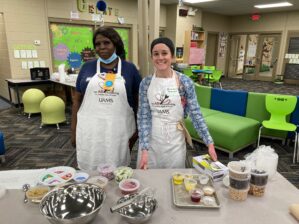
Alyssa Frisby, Culinary Medicine Registered Dietitian, and Culinary Medicine Sous Chef Agina Rasool partnered with the Little Rock Chapter of The Links, Incorporated to lead a nutrition presentation and hands-on demonstration for students in the JA Fair K-8 Preparatory School’s Next Generation Club. During this session, students learned about the benefits of including fiber in their diets and discussed foods that are good sources of fiber. A diet high in fiber can help lower cholesterol and help prevent heart disease and diabetes. Fiber also increases feelings of fullness, which may help with weight management. Students, with the help of The Links volunteers and J.A. Fair faculty and staff, prepared a grain and vegetable salad and crafted their own simple vinaigrette. The Mediterranean-inspired salad included quinoa, brown rice, tomatoes, chickpeas, cucumber, and red onion, and was full of flavor and fiber. Students then prepared batches of trail mix to take home and learned about the nutritional benefits of fiber-rich nuts, seeds, and dried fruit.
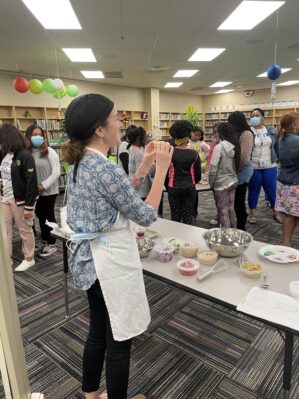
This program was the first in a two-part Culinary Medicine series presented by the Little Rock Chapter of The Links, Inc. A second nutrition presentation and hands-on activity was scheduled for mid-May.
Session Two
UAMS Culinary Medicine staff, joined by the Little Rock Chapter of the Links, Inc. volunteers, returned to J.A. Fair K-8 Preparatory School to promote healthy snacking, and discuss the importance of fruits and vegetables in a healthy diet. Alyssa Frisby, Culinary Medicine Registered Dietitian, and Culinary Medicine Director Dr. Gloria Richard-Davis led a nutrition presentation and hands-on demonstration for students in the J.A. Fair K-8 Preparatory School’s Next Generation Club. Students were asked to write down as many fruits and vegetables as they could think of using colorful markers. The exercise prompted students to think about fruits and vegetables as they collaborated with Links volunteers to fill out sheets of posterboard with a rainbow of colors.
During this session, students learned about the benefits of including a rainbow of fruits and vegetables in their diet. Fruits and vegetables contain essential vitamins and minerals, and many are high in fiber. Eating fruits and vegetables in place of higher-calorie, higher-fat foods, can help with weight management and may reduce the risk of some types of cancer and other chronic diseases. Fruits and vegetables such as watermelon, strawberries, and cucumbers also have a high water content, and incorporating these foods into a healthy diet can help students stay hydrated during the summer months.
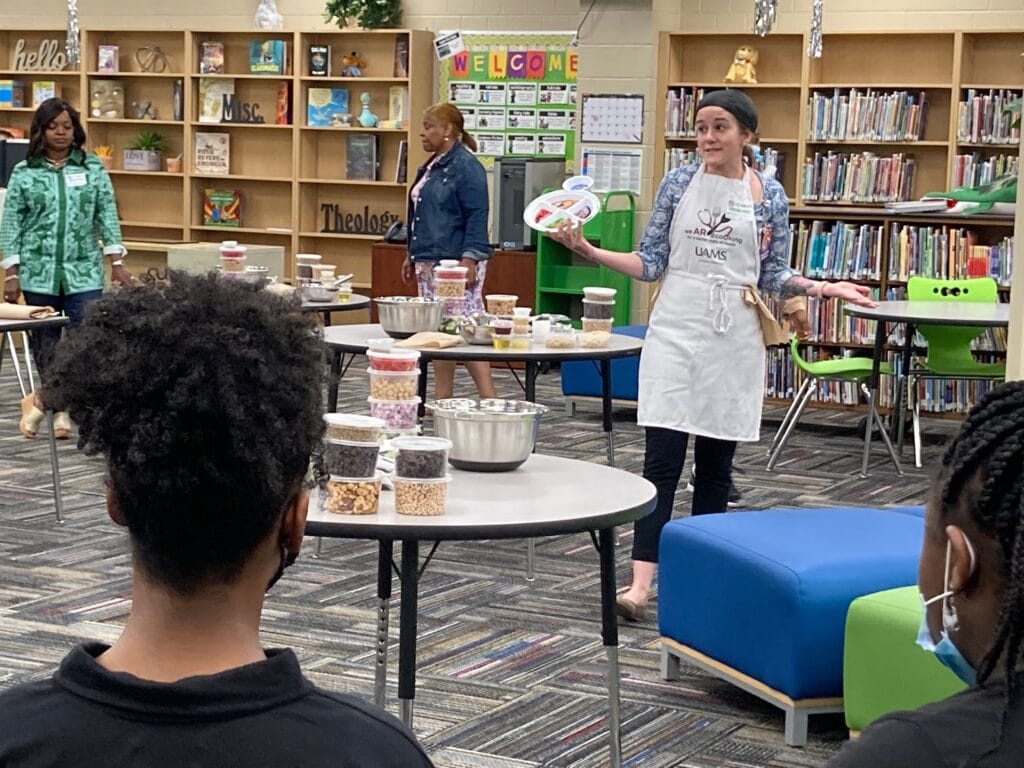
Students, with the help of The Links volunteers and J.A. Fair faculty and staff, prepared a smashed cucumber salad with rice vinegar and customized their salad flavor using ginger, garlic, and red pepper flakes. The students also prepared pinwheel wraps using cream cheese, and could add a combination of ham, strawberry jam, and cucumber to add flavor and texture. These light, healthy snacks are easy for students to prepare themselves and are a delicious option for a quick summer menu.
This program was the second session in a two-part Culinary Medicine series presented by the Little Rock Chapter of The Links, Inc.
Be a Part of the Cure
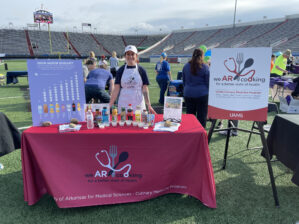
The University of Arkansas for Medical Sciences (UAMS) Culinary Medicine program participated in the UAMS Winthrop P. Rockefeller Cancer Institute’s Be a Part of the Cure event on Saturday, April 30 at War Memorial Stadium in Little Rock. The Be a Part of the Cure Walk aims to raise awareness in the community about cancer and to provide the participants with education on cancer prevention, screening, and therapeutic services available throughout Arkansas. Culinary Medicine registered dietitians Alyssa Frisby and Melissa Fenton created a healthy hydration display to show participants how much sugar is in common beverages. Bottled beverages were lined on the table and a portion cup of measured sugar was placed in front of each bottle. Each portion cup contained the amount of sugar found in each beverage.
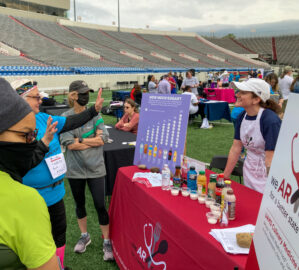
Event participants were surprised to see how much sugar these familiar beverages contained. Many took pictures to share with family and friends. The dietitians discussed the sugary beverages with participants and explained the importance of reading nutrition labels to determine how many grams of sugar their beverages contain, as well as what the serving size of each beverage is. The Dietary Guidelines for Americans 2020-2025 advise that Americans aged two years and older limit added sugars in the diet to less than 10% of total calories. The American Heart Association recommends no more than six teaspoons (24 grams) of added sugar for most adult women, and no more than nine teaspoons (36 grams) of added sugar for most men per day. The dietitians discussed ways to flavor water without adding sugar, and recommended opting for beverages that do not contain added sugars when trying to stay hydrated. The Culinary Medicine registered dietitians also promoted free on-campus teaching kitchen sessions and invited UAMS-employed participants to register using a special QR code. Community participants who are not affiliated with UAMS were invited to register for the free Zoom cooking sessions offered by Culinary Medicine. Teaching kitchen and Zoom cooking sessions are led by Culinary Medicine registered dietitians and offer participants the opportunity to learn basic cooking skills as well as nutrition information about the foods that are prepared.
